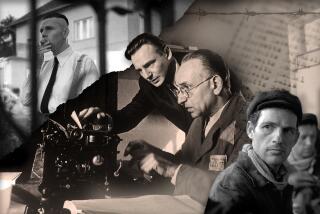Review: ‘It Is No Dream’ an uneven look at Theodor Herzl
- Share via
Though historians argue about the importance of individuals to the course of history, the significance of Theodor Herzl in the development of Zionism and the eventual creation of the state of Israel is hard to deny.
As detailed in the informative but uneven documentary “It Is No Dream: The Life of Theodore Herzl,” the passion this unexpected man developed for creating a homeland for the Jews was the sine qua non for putting modern European Zionism on the map. When Herzl said, in his most famous quote, “if you will it, it is no dream,” he proved as good as his word.
Directed by Richard Trank, who co-wrote it with Rabbi Marvin Hier, founder of the Simon Wiesenthal Center, this film is best when it focuses on Herzl’s absorbing life and less successful when it attempts to make points about the wider world. And even in telling Herzl’s story it has some bumps to overcome.
One thing that “It Is No Dream” makes quite clear is that Herzl was as unlikely a man as could be imagined to become Booster No. 1 for a Jewish homeland. Born in Hungary and raised in Vienna, Herzl, who could recite Goethe and Schiller by heart in the original German as a boy of 8, was initially Jewish in name only. Confirmed at age 13 rather than being bar mitzvahed, Herzl grew up to be a cosmopolitan playwright who joined a dueling fraternity, thought about being a lawyer and more or less fell into being a journalist and foreign correspondent for a major Vienna newspaper.
Herzl became his paper’s Paris bureau chief in 1894, which put him face to face with the Dreyfus affair when it erupted across France. The case, in which a Jewish French officer was framed for spying, thrown out of the army, humiliated and imprisoned, brought to the surface a wave of virulent anti-Semitism, including mobs regularly shouting, “Death to the Jews,” which completely changed Herzl’s world view.
Becoming obsessed with finding a solution to “the Jewish problem,” Herzl became a fiery advocate of an idea that already had adherents in Eastern Europe, the notion of having Jews return to their ancestral homeland in what was then a part of the Ottoman Empire.
Obsessed with finding money to purchase the land from the Turks and finance the emigration of Europe’s Jews, Herzl personally importuned everyone from the wealthy Rothschilds to the German kaiser to help him in his quest. “To be right,” he said, “you must be prepared to be considered crazy.”
Herzl’s mania compromised his health and affected every aspect of his life: When his father died, he refused to buy an elaborate vault because he wanted him buried in the yet-to-be-born Jewish homeland. “The idea must not die with me,” said Herzl who expired prematurely at age 44 and didn’t live to see Zionism’s eventual success.
Although director Trank is an Oscar winner for the documentary “The Long Way Home,” some of the choices made here are awkward. Too much time is spent on contemporary color photography of locations that were important to Herzl, and too few other voices are heard. And for those who remember actor Christoph Waltz’s Oscar-winning performance as an oleaginous Nazi in “Inglourious Basterds,” hearing his unmistakable voice reading Herzl’s words is at the very least unsettling.
“It Is No Dream” does not spend a great deal of time dealing with Palestine’s non-Jewish population, but it can’t resist, perhaps inevitably, using Herzl’s life to make points about today’s Middle Eastern situation. Still, partisanship was in Herzl’s blood, so the man himself would likely approve.
‘It Is No Dream: The Life of Theodor Herzl’
No MPAA rating
Running time: 1 hour, 37 minutes
Playing: At Laemmle’s Music Hall 3, Beverly Hills; Laemmle’s Town Center 5, Encino
More to Read
Only good movies
Get the Indie Focus newsletter, Mark Olsen's weekly guide to the world of cinema.
You may occasionally receive promotional content from the Los Angeles Times.











